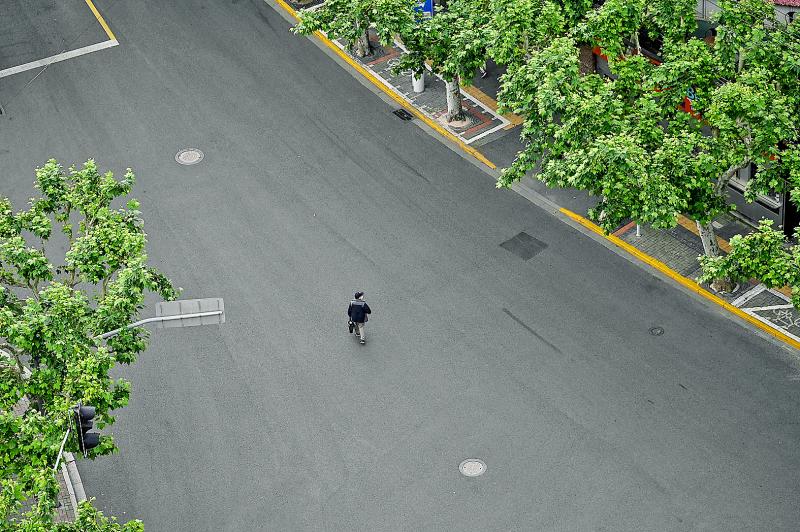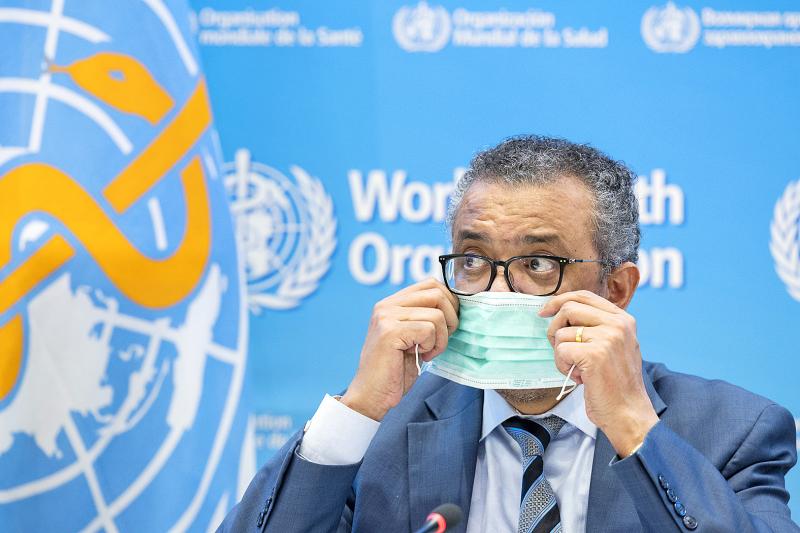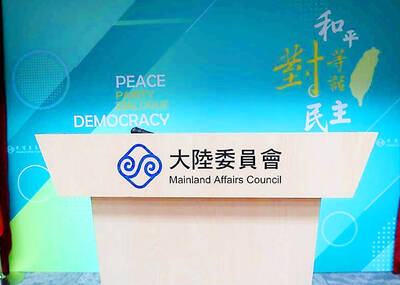China’s censors yesterday scrambled to wipe online debate over its “COVID-19 zero” strategy after the WHO criticized the country’s pandemic policies.
China’s COVID-19 policies have trapped most of Shanghai’s 25 million people in a lockdown with no clear end date, while Beijing has also gradually corralled many of its residents indoors as it battles its biggest outbreak since the pandemic began in 2020.
On Tuesday, WHO Director-General Tedros Adhanom Ghebreyesus urged China to change tack, saying that its approach “will not be sustainable” in the face of new fast-spreading variants.

Photo: AFP
The intervention prompted China’s army of Internet censors to snuff out his comments.
Searches for the hashtags “Tedros” and “WHO” on Chinese social media displayed no results, while users of the WeChat app were unable to share an article posted on an official UN account.
A social media hashtag about the WHO’s comments, which had been a rallying point for lively online discussion, appeared to have been blocked by mid-morning.

Photo: AP
Before they were expunged from the Chinese Internet, comments had questioned Beijing’s policies, with one saying: “Even the WHO’s Tedros has now changed his stance.”
Another wrote: “Will our government listen to the WHO director-general’s recommendations?”
Virus controls are causing anger and frustration, especially in Shanghai.
The city has witnessed repeated protests and violent scuffles with police, images that have pinballed across social media before censors can catch up.
The Chinese Communist Party says its virus strategy places life before material concerns and has averted public health crises.
Chinese Ministry of Foreign Affairs spokesman Zhao Lijian (趙立堅) brushed off questions about the WHO’s comments, saying that Beijing’s policy “can stand the test of history” and was “scientific and effective.”
“We hope that relevant individuals can take an objective and rational view of China’s epidemic prevention and control policies ... and refrain from making irresponsible remarks,” Zhao told a regular news conference.
Discussing Beijing’s strategy on Tuesday, Tedros said that WHO experts “don’t think that it’s sustainable, considering the behavior of the virus now and what we anticipate in the future.”
Hu Xijin (胡錫進), a former editor of China’s Global Times, slammed the comments in a message online, saying: “In the end, the WHO’s attitude isn’t important.”

NO RECIPROCITY: Taipei has called for cross-strait group travel to resume fully, but Beijing is only allowing people from its Fujian Province to travel to Matsu, the MAC said The Mainland Affairs Council (MAC) yesterday criticized an announcement by the Chinese Ministry of Culture and Tourism that it would lift a travel ban to Taiwan only for residents of China’s Fujian Province, saying that the policy does not meet the principles of reciprocity and openness. Chinese Deputy Minister of Culture and Tourism Rao Quan (饒權) yesterday morning told a delegation of Chinese Nationalist Party (KMT) lawmakers in a meeting in Beijing that the ministry would first allow Fujian residents to visit Lienchiang County (Matsu), adding that they would be able to travel to Taiwan proper directly once express ferry

STUMPED: KMT and TPP lawmakers approved a resolution to suspend the rate hike, which the government said was unavoidable in view of rising global energy costs The Ministry of Economic Affairs yesterday said it has a mandate to raise electricity prices as planned after the legislature passed a non-binding resolution along partisan lines to freeze rates. Chinese Nationalist Party (KMT) lawmakers proposed the resolution to suspend the price hike, which passed by a 59-50 vote. The Taiwan People’s Party (TPP) voted with the KMT. Legislative Speaker Han Kuo-yu (韓國瑜) of the KMT said the resolution is a mandate for the “immediate suspension of electricity price hikes” and for the Executive Yuan to review its energy policy and propose supplementary measures. A government-organized electricity price evaluation board in March

FAST RELEASE: The council lauded the developer for completing model testing in only four days and releasing a commercial version for use by academia and industry The National Science and Technology Council (NSTC) yesterday released the latest artificial intelligence (AI) language model in traditional Chinese embedded with Taiwanese cultural values. The council launched the Trustworthy AI Dialogue Engine (TAIDE) program in April last year to develop and train traditional Chinese-language models based on LLaMA, the open-source AI language model released by Meta. The program aims to tackle the information bias that is often present in international large-scale language models and take Taiwanese culture and values into consideration, it said. Llama 3-TAIDE-LX-8B-Chat-Alpha1, released yesterday, is the latest large language model in traditional Chinese. It was trained based on Meta’s Llama-3-8B

NOVEL METHODS: The PLA has adopted new approaches and recently conducted three combat readiness drills at night which included aircraft and ships, an official said Taiwan is monitoring China’s People’s Liberation Army (PLA) exercises for changes in their size or pattern as the nation prepares for president-elect William Lai’s (賴清德) inauguration on May 20, National Security Bureau (NSB) Director-General Tsai Ming-yen (蔡明彥) said yesterday. Tsai made the comment at a meeting of the Legislative Yuan’s Foreign Affairs and National Defense Committee, in response to Democratic Progressive Party (DPP) Legislator Wang Ting-yu’s (王定宇) questions. China continues to employ a carrot-and-stick approach, in which it applies pressure with “gray zone” tactics, while attempting to entice Taiwanese with perks, Tsai said. These actions aim to help Beijing look like it has